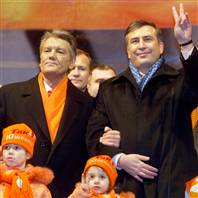
UKRAINIAN GOVERNMENT EXPRESSES STRONG SUPPORT FOR GEORGIA
Publication: Eurasia Daily Monitor Volume: 5 Issue: 154
By:

Ukraine’s president and the Ministry of Foreign Affairs, which comes under his jurisdiction, have reacted sharply to the Georgian-Russian conflict. President Viktor Yushchenko has close personal relations with President Mikhail Saakashvili with whom he is direct contact on a daily basis (www.president.gov.ua, August 9).
The Yushchenko-Saakashvili relationship is a political alliance based on the shared aims of the 2003 Rose and 2004 Orange revolutions, a common desire to join NATO and support for an alternative to Russia energy sources through the GUAM (Georgia, Ukraine, Azerbaijan, and Moldova) regional group. Ukraine and Georgia have also supported pro-U.S. positions in the UN on Belarus’s human rights record and in the CIS through the Community of Democratic Choice created in 2005. Ukraine and Georgia contributed the third largest military forces to the US-led intervention in Iraq (Ukraine until 2005 and Georgia since 2006).
Ukraine’s parliament, which is in summer recess, is a different matter. The two orange forces (the Yulia Tymoshenko bloc and Our Ukraine-Peoples Self Defense [Nuns]) follow the president’s line in support of Georgia’s position. Meanwhile, the Party of Regions (PR) and the Communist Party (KPU) hold positions that are not sympathetic to Georgia, at times pro-Russian and at other times contradictory and duplicitous.
The PR and KPU have both demanded an investigation into Ukrainian supplies of arms to Georgia. The KPU has accused the Ukrainian authorities of having armed the Saakashvili regime and has described Saakashvili as an “international criminal.”
Such accusations and inflammatory rhetoric echo those emanating from Moscow and the South Ossetian and Abkhaz separatists. Russian and separatist leaders have accused Ukraine of assisting alleged Georgian “ethnic cleansing” of South Ossetia and of “arming the Georgian army to the teeth.” The Georgian Ministry of Foreign Affairs defended Ukraine by accusing Russia of having armed the separatists (Ukrayinska Pravda, August 9-10).
These accusations ignore the fact that “military-technical cooperation between Ukraine and Georgia, which has taken place over the last 15 years, has been within the parameters of international law” (Zerkalo Nedeli, August 9). Ukrainian supplies of military equipment to Georgia began during Leonid Kuchma’s presidency, and continued under the government of PR leader Viktor Yanukovych from 2002 to 2004. Ukrainian troops were sent to Iraq by the same Yanukovych government.
The Ukrainian Foreign Ministry’s demand that Russia withdraw its troops and respect Georgia’s territorial integrity is an established position articulated under Kuchma. Ukraine’s offer of acting as a mediator is again a long-standing proposal that was rejected by Russia under Kuchma and again now (Ukrayinska Pravda, August 8-9).
Former U.S. Assistant Secretary of State Richard Holbrooke’s comment that Russia’s next objective would be Ukraine is a fear long held in Kyiv. The initial impetus for creating the GUAM group in 1998 was that of Russian-backed separatism in three of its members (Moldova, Georgia, Azerbaijan) and a threat to the Crimea. The Russian parliament continually laid claim to the Crimea and Sevastopol in the 1990s, the island of Tuzla in 2003 and to Sevastopol as recently as May l.
Ukraine’s unease at Russia’s continued territorial demands led to a presidential decree ordering the government to prepare legislation and conduct negotiations with Russia on a full withdrawal of the Black Sea Fleet (BSF) personnel by 2017. BSF personnel, who are Russian citizens, have illegally participated in anti-NATO and pro-separatist rallies.
Russian nationalist, Communist and pro-regime politicians are unanimous in using the Crimea and Sevastopol as a potential bargaining chip to halt Ukraine’s NATO membership. This reflects long-standing Russian views as expressed by President Vladimir Putin at the April NATO-Russia Council that the alleged “fragility” of Ukraine would cause it to disintegrate if it joined NATO (Zerkalo Nedeli, April 19).
Crimean KPU leader Leonid Grach threatened to support the peninsula’s secession from Ukraine if it joined NATO. The view was criticized by the head of the parliamentary Committee on European Integration and deputy leader of the Nuns faction Borys Tarasyuk (www.nuns.com.ua, August 8). Crimea’s Communists, which are a regional branch of the KPU, played a positive role in the 1990s in supporting Ukraine’s territorial integrity and adopting the 1998 pro-autonomy constitution.
The Simferopol city council voted on July 24 to declare itself a “‘territory free from NATO.” The vote was supported by the “For Yanukovych” faction and the national Bolshevik-oriented Natalia Vitrenko bloc. The PR would lose votes in eastern Ukraine if it began to play, like the KPU and Vitrenko bloc, with separatism.
Russian Communist leader Gennady Zyuganov arrived in the Crimea during the Ossetian crisis to hold negotiations with Crimean Communists on a “joint anti-NATO struggle.” Zyuganov said the Saakashvili regime was undertaking “state terrorism” with the support of the United States and NATO (UNIAN, August 9). Zyuganov supported the independence of South Ossetia and Abkhazia and has long supported Sevastopol’s transfer to Russia.
The stakes are high for Yushchenko and Ukraine in the Ossetian crisis. The removal or weakening of the Saakashvili regime would undermine the Ukrainian-Georgian partnership, destroy the GUAM group (which already has a passive Moldova) and thereby neutralize the pro-Western wing of the CIS. Ultimately, the most important impact of the crisis will be on the December meeting of NATO Foreign Ministers set to review Ukraine and Georgia’s “‘progress,” held at a time of regime change in the United States.
The two arguments against admitting Ukraine and Georgia to NATO–political instability in Ukraine and Georgia’s military conflict with Russia–have become stronger since they were raised by Germany and France at the April Bucharest NATO summit. It is therefore unlikely that the review meeting will send a positive signal to Ukraine and Georgia about being granted NATO MAPs.




